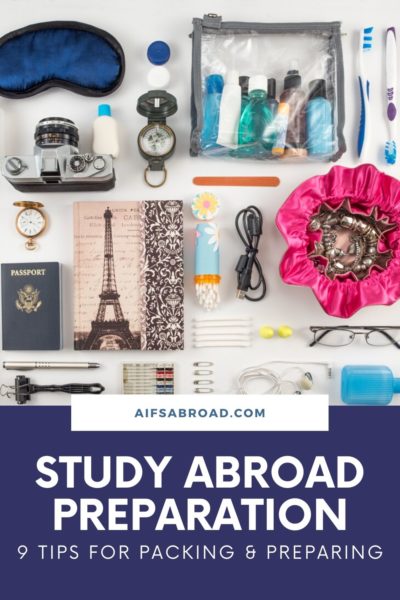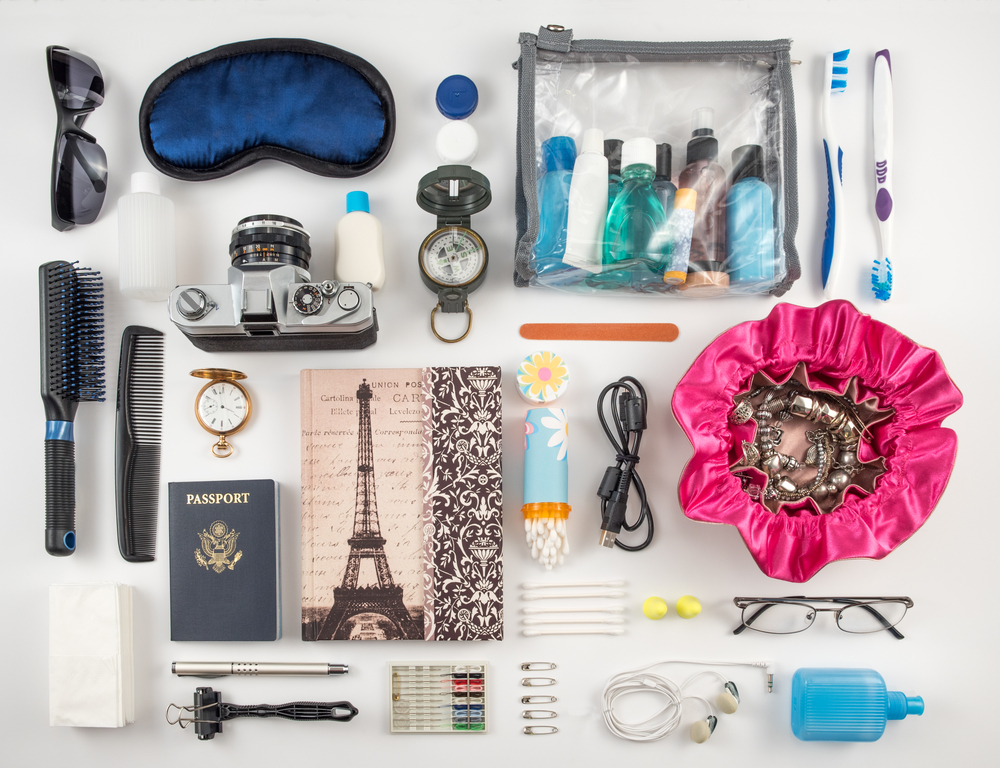Last Updated on November 28, 2023 by Lyndsey Bradley
One of the first challenges that you face when preparing for studying abroad is knowing what to pack. If you pack correctly then you will be at ease for your time abroad. But if you don’t, then you could be feeling a lot of regret and stress. The trick is putting in a bit of thought beforehand.
Regardless of where you will be studying abroad, I think that the smartest way to pack is to use one large luggage bag with wheels, one smaller one with wheels as your carry-on, and a big, sturdy backpack. There is really no need to bring anything more than that with you — and any more that that will only make things more difficult for yourself.
Here are 9 must-heed pieces of advice when you’re preparing for studying abroad, particularly when it comes to packing:
1. Make a study abroad packing list before you get to it.
Do not put packing off until the night before you leave. If your’e preparing to study abroad for a semester, you will be spending 1/3 of a year away from home. It is essential that you pack properly.
2. Utilize your resources.
Read the suggested packing list, ask friends who have studied abroad before, and use the internet! Find out what the weather will be like, how the locals dress, and what you will and will not be able to buy at stores. On my suggested packing list for Costa Rica it said to pack sunscreen and bug spray. But what it did not say was that in Costa Rica they are each nearly $20 per bottle! As I would be at the beach most weekends and the sun is much more powerful than it is at home, it’s a good thing I Googled that one beforehand.
3. Know yourself and your lifestyle.
Researching beforehand is very important when preparing for studying abroad and will help you tremendously, but ultimately you need to think about what you will need for yourself. For example, the packing list might not say to bring sweatpants, but if you are the kind of person that is always cold, that might be one thing to add.
4. Take advantage of tiny toiletries.
Before you leave the United States, have a small toiletries bag packed. Stash it in your carry-on for the worst case scenario where something happens to your flight. Then, once you arrive, use it for the many weekend trips you’ll be taking. I have Tylenol, shampoo, conditioner, soap, toothpaste, Band-Aids, tweezers, and and deodorant in mine. All travel size things. It makes things much simpler for yourself.
That being said, even if it isn’t suggested, I would recommend bringing shampoo, conditioner, and soap. I would say to bring a little less than you think you’ll need. Even though it is easy enough to just take a trip to the grocery store, it makes space for some things for when you come home.
5. Make sure that you have some kind of a “to-go bag.”
I use a drawstring bag for anytime I leave the house because it would be difficult for people to steal from it since it doesn’t have zippers, and it has a pouch for a water bottle. This is also a great bag to bring to the beach or on a hike. I keep my wallet, rain jacket, umbrella, water and hand-sanitizer in it. You can also throw it in the washing machine. And if I buy anything I won’t have to carry it. A purse might also work for some people.
6. Sort your clothing situation out in advance.
Bring a lot of neutral and interchangeable items.
I know you have super cute, super cool clothes that you love to wear. Don’t bother bringing them unless they are easy to mix and match. You will only be able to bring maybe less than ten tops. No one will notice if you wear that black shirt two days in a row, but they will notice that neon tie dye shirt that you got tons of compliments on.
If you don’t wear it at home, you won’t wear it abroad.
Space is scarce when packing. Don’t waste it on something that you won’t wear.
Bring layers.
You’ll likely be in a new climate for months. Weather is unpredictable. You don’t want to be stuck freezing, or sweating to death.
OMG, shoes.
Shoes are probably the hardest part about packing. You want to be prepared but not over-prepared because they take up so much space. This is unique to each location, but comfortable and neutral is always a safe bet.
7. Bring a keepsake from home.
Bring something from home that you can share with the new people you meet. The conversation about what your culture is like will come up, so having something to share with them is always sweet. Since I’m from Vermont, I brought a bunch of maple candies to share.
8. Take a journal with you.
Do your future self a favor and journal while you are abroad. It is impossible to remember every thing that you will have done. So if you write yourself a little blurb of what you did each day or each week. I’m sure your future grandkids would love to read about their grandparent’s world traveling adventures one day.
9. It’s not 1999 anymore. Go electronically prepared as well.
Decide if you are going to need a phone plan or not when you’re preparing for studying abroad. I decided to go without because I have noticed that the only thing that I use internet for when I’m not home or at school is social media, which is not something I should be doing while I’m out and about anyway. There should be internet where you will be living for homework. You can use Google Maps without internet if you know how to read a map. It has actually been a mini challenge that I have enjoyed. I also made arrangements with my cell phone carrier so that if I am in some kind of emergency, I can take my phone off airplane mode and use my normal plan for $10/day, which would be expensive too, but it makes me feel safer knowing I have that safety net.
To help myself not forget anything important for study abroad, I used the Google Keep app on my phone to make a running list of things as I thought of them.
The new “it thing” is to live like a minimalist. So try and think like one while packing.
This post was contributed by Lyndsey Bradley, who is studying abroad with AIFS in San José, Costa Rica.

